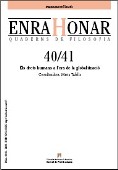Do we need new rights in Cyberspace? Discussing the case of how to define on-line privacy in an Internet Bill of Rights
Article Sidebar

Main Article Content
David Casacuberta Sevilla
Universitat Autònoma de Barcelona. Departament de Filosofia
Max Senges
Universitat Oberta de Catalunya
During the early days of Internet it was widely defended that being in an on-line environment clearly transformed some human rights; and might even create new ones. We argue for the consideration of an Internet Bill of Rights (IBR) however rather than inventing new rights, we propose that some rights have to be reconsidered within the emerging virtual context. Privacy, anonymity, freedom of expression, and so are not exactly the same rights we have in the realm of our physical being. What changes are some inarticulate contextual conditions, which make some people think that rights are actually changing. This has theoretical implications. We attempt to show that there is no need to re-think rights like privacy from the beginning, or even eliminate it, as some scholars propose. It also has implications for policy making, as it provides a general methodology to consider and adapt to virtual contexts in order to assure that basic human rights can be correctly applied and defended in cyberspace.
Keywords:
digital technologies, information society, privacy, virtual versus real, new rights
Article Details
How to Cite
Casacuberta Sevilla, David; and Senges, Max. “Do we need new rights in Cyberspace? Discussing the case of how to define on-line privacy in an Internet Bill of Rights”. Enrahonar: an international journal of theoretical and practical reason, no. 40, pp. 99-111, https://raco.cat/index.php/Enrahonar/article/view/85368.
Most read articles by the same author(s)
- David Casacuberta Sevilla, E-inclusion: the cognitive challenges , Enrahonar: an international journal of theoretical and practical reason: 2007: Núm.: 38-39 Escriptura, testimoni i creació. Miscel·lània
- David Casacuberta Sevilla, Presentació. Trenta anys d’Enrahonar, Orient i Occident , Enrahonar: an international journal of theoretical and practical reason: 2011: Núm.: 47 Pensament oriental i ciències cognitives
- David Casacuberta Sevilla, Nine difficulties to understand digital culture , Enrahonar: an international journal of theoretical and practical reason: 2001: Núm.: 32 -33
- David Casacuberta Sevilla, Presentation. Thirty years of Enrahonar, East and West , Enrahonar: an international journal of theoretical and practical reason: 2011: Núm.: 47 Pensament oriental i ciències cognitives
- David Casacuberta Sevilla, BATCHELOR, Stephen (2010). Confessions of a Buddhist Atheist , Enrahonar: an international journal of theoretical and practical reason: No. 52 (2014): Religion in public space
- David Casacuberta Sevilla, Actualidad de la concepción cartesiana de las emociones , Enrahonar: an international journal of theoretical and practical reason: 1999: Extraordinari
- David Casacuberta Sevilla, ESTANY, Anna. Introducción a la filosofía de la ciencia , Enrahonar: an international journal of theoretical and practical reason: 1995: Núm.: 23
- David Casacuberta Sevilla, Presentación. Treinta años de Enrahonar, Oriente y Occidente , Enrahonar: an international journal of theoretical and practical reason: 2011: Núm.: 47 Pensament oriental i ciències cognitives
- David Casacuberta Sevilla, Sumari , Enrahonar: an international journal of theoretical and practical reason: 2011: Núm.: 47 Pensament oriental i ciències cognitives